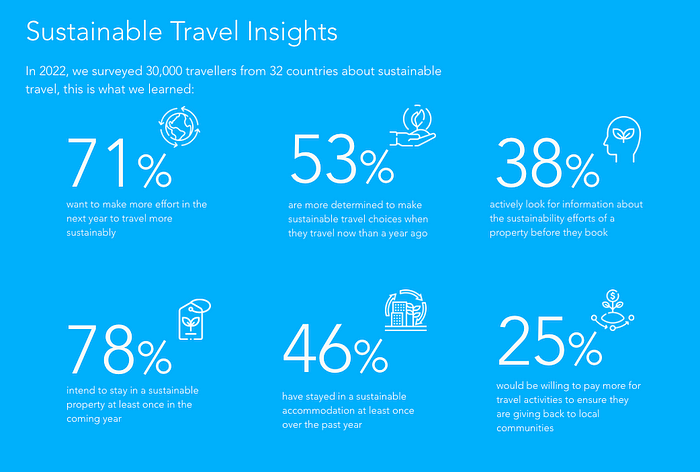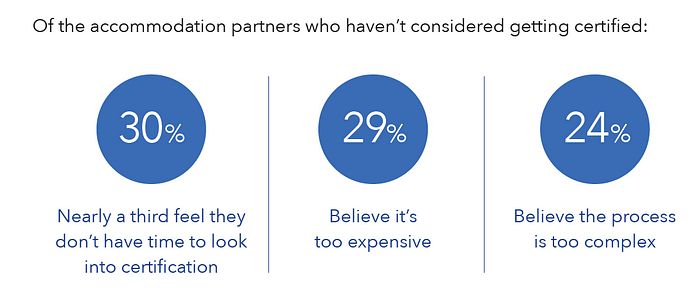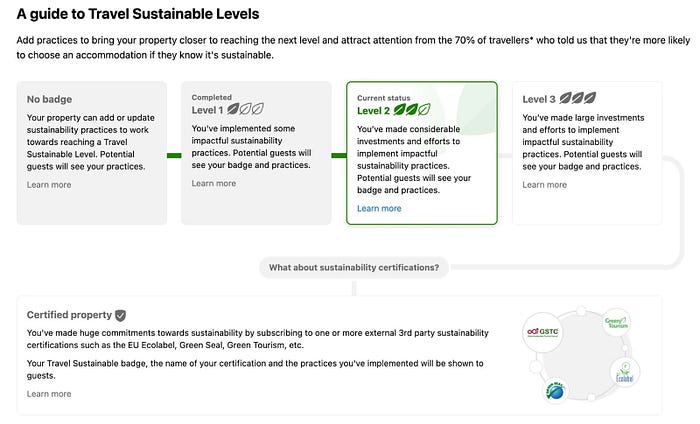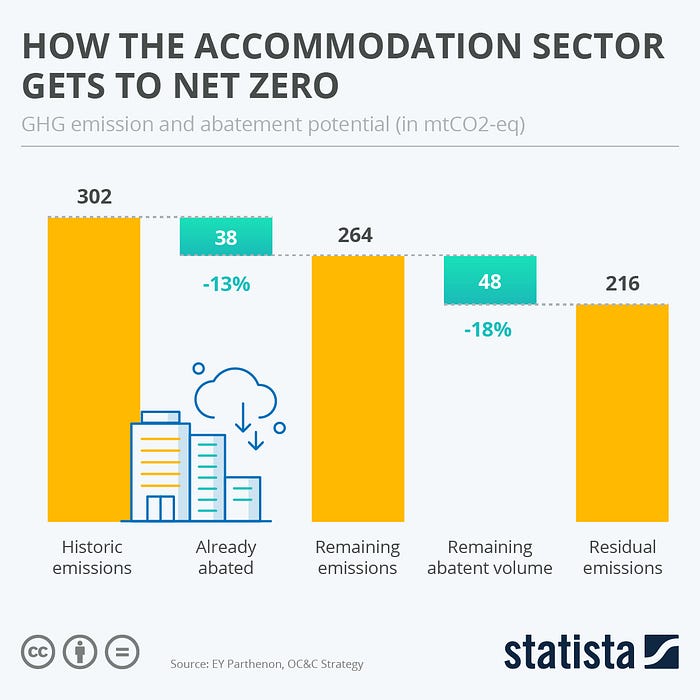Enabling innovation and investment in sustainable tourism: the role of EU’s environmental labels

Europe is setting the pace in the transition towards a more sustainable, carbon-neutral future. And our travel and tourism sector is second to none. These twin advantages uniquely position the continent to become a global leader in sustainable tourism.
This article examines the challenges faced by the travel industry as it seeks to make a contribution within the broader EU Green Deal agenda. It also considers how Europe’s legal framework could help foster trust, transparency, and innovation in environmental labelling, paving the way for a more sustainable tourism industry.
Environmental labels make it easier for consumers to make more sustainable choices and for businesses to be recognised for their investments and efforts. However, with sustainability being a buzzword, there is also a risk of misleading claims and greenwashing.
The European Commission’s initiatives on empowering consumers for the green transition and on green claims aim to foster transparency and promote trust in environmental labels. To deliver on this objective, the rules must address the unique challenges of various economic sectors, be it goods or services. The right regulatory framework will encourage investments in sustainability, thereby achieving more scale and impact. This is particularly important in the tourism sector in Europe which is highly fragmented. An empowering regulatory environment for businesses and consumers will better equip our hospitality entrepreneurs to rise to the challenge of building a more sustainable future.
SME hotels and the uptake rate of environmental labels

Consumers, as well as service providers, are united in wanting a more sustainable travel experience. Four in five travellers (78%) intend to stay in a sustainable property at least once in the coming year.
fewer than 1% (6,000) tourism accommodations have a third-party certified sustainability label
While we see a consistent increase in travellers’ interest in sustainability, it is still a niche and elite part of the market. Out of the millions of accommodation listings on our platform, currently, fewer than 6,000 tourism accommodations have a third-party certified sustainability label, that is less than 1% of accommodations.
There are over 600,000 accommodation establishments in Europe, and roughly 70% are SMEs. In our research, we see that many SME accommodations don’t know where to start and how to continue, are uncertain of the impact of the initiatives on their customers, or how to showcase the practices they have adopted. They often lack the operational resources to systematically engage with sustainability. Third-party certifications, such as Green Key or EU Ecolabel, while the gold standard, require important resources and investment and are not broadly recognised beyond local audiences, which can make them unappealing to many accommodations.
 Sustainability in tourism: Challenges, opportunities and the role of Booking.com
Sustainability in tourism: Challenges, opportunities and the role of Booking.com
Travel Sustainable Program and Badge
To address this gap, we have introduced the Travel Sustainable Program, where we share insights and best practices to improve the access of hospitality-sector entrepreneurs to relevant information and guide our partners in their efforts. An essential part of this program is a Travel Sustainable Badge, which recognises the level of sustainability practices accommodations have implemented. In other words, we’ve created a ladder for hoteliers to ascend — one step at a time.
The experience with the Travel Sustainable Program shows the potential for scaling
Enabling this transition is particularly important for SME accommodations. An expectation that many will make a jump from zero straight to the third-party certifications is simply unrealistic. Our accommodation partners are on a journey: some are only starting out, and some are already experts. By recognising accommodations that have reached a threshold of meaningful impact we support our partners step-by-step in their individual and unique path of green transition.
As the old proverb goes, a journey of a thousand miles begins with a single step. And we want our accommodation partners to feel empowered to take it: all the way up to the gold standard of third-party certifications. Our program recognises and celebrates the outstanding commitment and investment of partners who attain one of more than 40 certifications or ecolabels such as Green Key or EU Ecolabel.
 Booking.com: Badge levels for Travel Sustainable
Booking.com: Badge levels for Travel Sustainable
When the upside is easy to grasp, the path forward is split into digestible steps, tourism-sector entrepreneurs will find themselves more empowered to ascend the ladder
Encouraging innovation and investment
We launched the Travel Sustainable Badge in 2021, and by now, 1,250,000 accommodations globally have shared at least some information about their sustainability practices. And of that 1.25 million, over 500,000 are being recognised for their efforts to operate more sustainably globally (the figures for the EU stands at 275,000 as of April 2023). In addition, on Booking.com, travellers can clearly see where individual accommodations are on their sustainability journeys and what practices they have implemented.
At the core of this flywheel of innovation and investment is the matching of supply with demand
The experience with the Travel Sustainable Program shows the potential for scaling. When the upside is easy to grasp, the path forward is split into digestible steps, tourism-sector entrepreneurs will find themselves more empowered to ascend the ladder, and the cumulative impact will be enormous.

Statista: Global accommodation sector: the road to net zero emissions
At the core of this flywheel of innovation and investment is the matching of supply with demand. It is indeed quite simple, but it is not easy. When the travellers who want to stay at sustainable properties find what they are looking for, the hoteliers will see that their guests appreciate efforts to operate more sustainably, and the investments are paying off. This is how we can ignite the virtuous cycle on the path to net zero.
An enabling regulatory environment
The European Commission is pursuing the right goals in setting a regulatory framework to fight greenwashing. Booking.com shares that objective. With our Travel Sustainable programme, we want to empower consumers to make informed choices while supporting accommodations to transition to sustainability at the pace that best suits each individual hospitality enterprise. We believe this is key to activating the flywheel mentioned above.
Indeed, misleading claims and disappointing experiences could spoil consumers’ thirst for sustainability without proper guardrails in place. On the other hand, a horizontal regulatory framework proposing a rigid one-size-fits all approach could stifle innovation, a necessary element to move the needle on sustainability.

there is no one solution to climate change. It’s going to take a range of actions, from technological innovation to changes in behaviour, to make a real impact
Achieving the green transition is our shared objective. Booking.com is strongly committed to a more sustainable industry. This is why we would welcome a regulatory environment that embraces positive innovation, encourages investment, and recognises the need to leave room for the transition to take place. Different initiatives, bringing more tailored approaches to specific challenges, can complement one another. Together, we can achieve real impact. This is the way to truly support the acceleration of the green transition.
As Al Gore once noted, “there is no one solution to climate change. It’s going to take a range of actions, from technological innovation to changes in behaviour, to make a real impact.”






